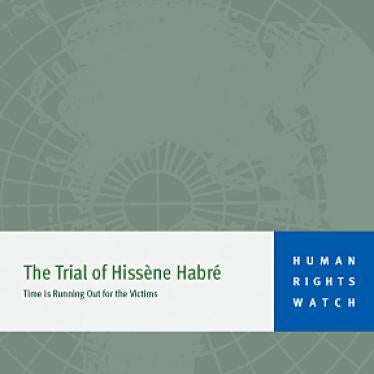(New York) - The Belgian Supreme Court decision permitting an inquiry into the 1982 massacre of civilians in the Palestinian refugee camps of Sabra and Shatilla is a landmark step for international law, Human Rights Watch said today. The decision will also allow a number of other cases pending in Belgium to move forward, including that of former Chadian dictator Hissène Habré.
The Sabra and Shatilla case was brought under a 1993 law, which gives Belgian courts the authority to prosecute persons accused of genocide, crimes against humanity or war crimes regardless of where the crimes took place or whether the suspect or the victims are Belgian. Wednesday's ruling made clear that investigations could go forward even when the suspect was outside of the country.
The Belgian Supreme Court (Cour de Cassation) ruled Wednesday that one of those named by the massacre victims in a criminal complaint, Israeli Prime Minister Ariel Sharon, enjoyed immunity from prosecution as long as he serves in that position, but that investigations could proceed against his co-defendant, former Israeli army commander Amos Yaron.
"This decision is a huge victory not only for the victims of the Sabra and Shatilla massacres but for all atrocity victims who have put their hopes in the Belgian justice system," said Hanny Megally, executive director of the Middle East and North Africa division of Human Rights Watch. "There is abundant evidence that war crimes and crimes against humanity were committed in the Sabra and Shatilla massacre, but not a single individual has been brought to justice."
As Defense Minister, Ariel Sharon had overall responsibility over the Israeli Defense Forces and allowed Phalangist militias to enter the camps where they terrorized the residents for three days. In February 1983, the three-member Israeli official independent commission of inquiry charged with investigating the events known as the Kahan Commission named former Defense Minister Sharon as one of the individuals who "bears personal responsibility" for the Sabra and Shatilla massacre.
Human Rights Watch noted that the decision will allow the case against Chad's exiled former president, Hissène Habré, to go forward after a Belgian judge and police team visited Chad last year to investigate the charges. Habré lives in exile in Senegal, where he was indicted two years ago on charges of torture and crimes against humanity before the Senegalese courts ruled that he could not be tried there. The president of Senegal has agreed to hold Habré pending an extradition request from Belgium and the government of Chad recently told Belgium that it would waive any immunity that Habré might seek to assert.






